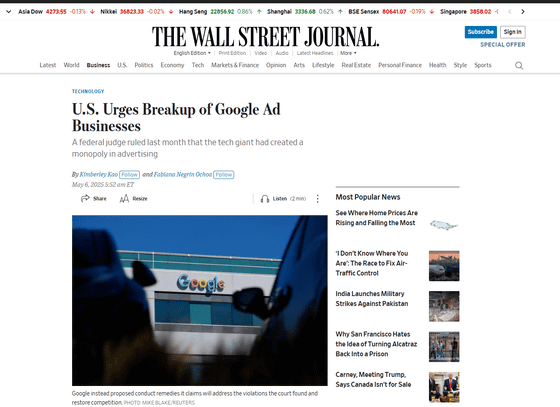The Department of Justice has stated that Google should sell its advertising businesses AdX and DFP, but Google has strongly opposed it, saying it is not possible to do so.

The U.S. Department of Justice (DOJ) has filed a proposal in court to break up Google's key advertising-related businesses following a federal court ruling that found the company had illegally acquired and maintained a monopoly position in the ad tech market. The DOJ is calling for the sale of Google Ad Exchange (AdX) and Google Ad Manager (DoubleClick for Publishers: DFP), the company's ad serving platform for publishers.
US Urges Breakup of Google Ad Businesses - WSJ

DOJ asks court to split up Google's ad tech empire | The Verge
https://www.theverge.com/news/661833/google-ad-tech-business-doj-break-up
US DOJ wants Google to sell two of its ad products | TechCrunch
https://techcrunch.com/2025/05/06/us-doj-wants-google-to-sell-two-of-its-ad-products/
AdX is a trading marketplace where advertisers and publishers such as website operators buy and sell online ad space, and is a platform where bidding and trading takes place in real time for each ad impression. For each ad space, multiple advertisers bid almost in real time, and the ad offering the highest price is displayed in that space. This AdX is connected to Google's own powerful ad network, which is said to be the cause of the market structure that is heavily dependent on Google.

DFP is an ad delivery system that Google acquired from DoubleClick in 2007. DFP is an ad delivery server that is mainly used by publishers who own websites to manage their ad space and optimize the ads they display, and has functions such as ad inventory management, delivery settings, and effectiveness measurement. DFP can compile data such as the number of times an ad is displayed, the number of clicks, and the amount of revenue, and can be viewed as a report, making it possible to visualize the effectiveness of advertising operations and lead to improvements.
In 2018, Google integrated DFP and AdX and launched it under the new name 'Google Ad Manager.' This brings together ad inventory management and trading functions into a single platform, enabling comprehensive ad management.

However, on the flip side, this means that when publishers use DFP, they automatically use AdX, a structure that has been criticized by the Department of Justice as leading to the elimination of competitors and a monopoly on the advertising market.
The Department of Justice pointed out that AdX 'has made it difficult for users to switch to competitors and stifled market competition,' and proposed a gradual process for the sale of DFP, including providing an API to enable integration with other ad exchanges, implementing a data export function, and making the final ad auction code available as open source.
The Department of Justice also proposes restricting Google from sharing the data it collects through DFP and from using its data from YouTube, Gmail, Search, Chrome, Android and other platforms for a competitive advantage.
On the other hand, Google countered the DOJ's proposal, arguing that the sale of AdX and DFP lacked legal basis and was technically impractical. The company argued that these tools are deeply embedded in Google's infrastructure, and that simply transferring the source code to a third party would not work, and that a new system would have to be built from scratch. It also warned that the process would require significant time and human resources and would have serious impacts on current users.

Google has offered an alternative plan to address the issues raised by the Department of Justice by eliminating some of the practices cited, such as providing AdX real-time bidding information to competing ad servers, eliminating Uniform Pricing Rules, and not reintroducing auction favoritism features such as First Look and Last Look.
The Department of Justice's pressure on Google is not limited to the advertising technology sector; it is also demanding the sale of its Chrome browser in a separate case, forcing major changes to Google's entire business structure.
in Web Service, Posted by log1i_yk